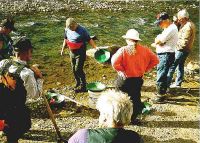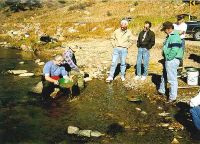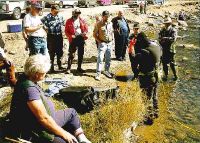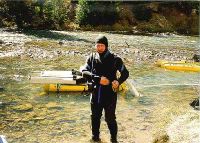 On October 18th, 1997, the Gold Prospectors of the Rockies held an Advanced Dredging Workshop. This was a follow up to the Beginning Dredging Workshop that was held in the spring. The weather was cooperative and it was a glorious fall Colorado day. The air temperature was in the 60s. The water temperature was in the 40s and cold to bare skin but was not bad when using the proper equipment, i.e., gloves and wet suit, if you were getting in the water to dredge. Attending were about 25 GPR club members and guests.
On October 18th, 1997, the Gold Prospectors of the Rockies held an Advanced Dredging Workshop. This was a follow up to the Beginning Dredging Workshop that was held in the spring. The weather was cooperative and it was a glorious fall Colorado day. The air temperature was in the 60s. The water temperature was in the 40s and cold to bare skin but was not bad when using the proper equipment, i.e., gloves and wet suit, if you were getting in the water to dredge. Attending were about 25 GPR club members and guests.
Immediately preceding the dredging workshop was the monthly Panning Workshop held for any member, new or old, desiring to learn or improve their panning skills. The discussion began with demonstrations of pieces of equipment utilized for panning.
 Gold pan, shovel, 5-gallon bucket, classifiers, and snuffer bottles. With the cold water temperature, discussion soon turned to cold water techniques and insulated panning gloves. These are a real necessity for any other than summer panning in Colorado as our water begins it's life as snow not too far upstream.
Gold pan, shovel, 5-gallon bucket, classifiers, and snuffer bottles. With the cold water temperature, discussion soon turned to cold water techniques and insulated panning gloves. These are a real necessity for any other than summer panning in Colorado as our water begins it's life as snow not too far upstream.
After discussions of the equipment, it's costs, how to use it, and where to look for gold became the hot topics. After the traditional places were mentioned, some of the more experienced members added some of the unlikely spots where they had found gold in the past. After the discussion, panning instructions and demonstrations were given. After the basics were demonstrated, the "experts" assisted the beginning panners in their initial attempts to maneuver the gold pan. They soon discovered that what the old timers did was not as easily duplicated as expected. There is no quick substitute for hours of panning practice. After an hour everyone was ready to begin a search on their own.
 Next, the group assembled around a pair of dredges. A Keene 5-inch triple sluice and a Keene 4-inch under sluice. The basics of the operation of each unit was quickly summarized as had been explained in detail at the beginning workshop. All of the miscellaneous dredging equipment was laid out on the ground for close examination, including the "hooka," regulator, hose assembly, the reserve air tank, the different styles of weight belts, a wet suit and all of it's assorted pieces, different types of diving boots, diving masks, and full face masks. The advantages and disadvantages of each piece was explained along with it's approximate price range.
Next, the group assembled around a pair of dredges. A Keene 5-inch triple sluice and a Keene 4-inch under sluice. The basics of the operation of each unit was quickly summarized as had been explained in detail at the beginning workshop. All of the miscellaneous dredging equipment was laid out on the ground for close examination, including the "hooka," regulator, hose assembly, the reserve air tank, the different styles of weight belts, a wet suit and all of it's assorted pieces, different types of diving boots, diving masks, and full face masks. The advantages and disadvantages of each piece was explained along with it's approximate price range.
The donning of a typical wet suit was demonstrated. To someone who has never seen this, it is the male equivalent of pulling on a tight, full-body-sized girdle. A wet suit works best if it isn't too loose. If it is too loose, it allows too much water flow on the inside and it is not as warm as a restrictive one. What that really means is it is not easy to get into. Especially if it is wet from the last time it was worn. Some people even use body powder to make it easier to get into their wet suits.
 Equipment safety was discussed, including the proper way to put on the regulator and weight belt harness. Quick releases have to be positioned to release in the same direction and for ease of reach when an emergency situation requires fast abandonment of these restrictive devices. Sixty pounds of lead weight makes it difficult to maneuver easily under adverse situations. Different procedures of putting on a 60-pound weight belt by yourself were also demonstrated. It is much harder than it sounds. It's times like this when you really appreciate your dredging buddy. He makes the whole dressing procedure much easier.
Equipment safety was discussed, including the proper way to put on the regulator and weight belt harness. Quick releases have to be positioned to release in the same direction and for ease of reach when an emergency situation requires fast abandonment of these restrictive devices. Sixty pounds of lead weight makes it difficult to maneuver easily under adverse situations. Different procedures of putting on a 60-pound weight belt by yourself were also demonstrated. It is much harder than it sounds. It's times like this when you really appreciate your dredging buddy. He makes the whole dressing procedure much easier.
After all of the questions were answered, it was time for the fun part--getting in a little nozzle time. All of the equipment was loaded on the dredges and they were moved upstream several hundred yards and staked out for the continuation of a great day. One of the dredges was placed into service as a ferry and used to haul a high banker upstream. Things are much easier to float than carry. The sun was shining and the water was a nice 40 degrees fahrenheit. Did we find a lot of gold? Well, I didn't. If someone hit a bonanza they kept it to themselves. FAT CHANCE. Did you ever see a prospector or miner who could keep a secret when he was finding gold? What we did find though was a great looking bedrock ledge behind which we could work next year.
Photo credits: All by Leonard Leeper